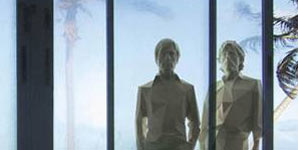Review of Le Voyage Dans Le Lune Album by Air
As far as cinematic visionaries go, Georges M'liSs is usually ranked among the top of the heap. Widely consider the first science-fiction film, M'liSs a was true legend in his field, regardless of how dubious that title may now seem. Imagine then the honour bestowed on fellow Frenchmen Jean-B'noit Dunckel and Nicolas Godin when approached to score the newly remastered edition of the film in glorious Blu-Ray quality.

After watching the film, the 1902-mindset of France; industrial awakenings, scientifically competitive and colonially driven, comes across a great deal. The smog-laden backdrop after the meeting between the astronomers, not to mention the notion of space travel, in a time when aeronautics was at its infancy, was as ambitious an idea as M'liSs film would exemplify early twentieth century production and experimentalism. The scenes on the moon when the explorers attack, and kill, the inhabitants of the satellite without mercy or thought sums up the colonial notion that if you can get there and are stronger than the native, then frankly the land is yours to rule and you will be treated as a hero upon your return home. The question is how do you score these scenes when the audience is now 110 years older? The answer lies in Dunckel and Godin's meticulous production process and the typical approach the two take towards their work.
Themselves being no strangers to the world of film scores, working with Sophia Copolla a number of times (on The Virgin Suicide and Lost in Translation most notably) the two create an otherworldly soundtrack, with hints of nostalgia sprinkled over to compliment. The use of piano on 'D'collage' and 'Retour Sur Terre' adds a more human touch to the overall sound and makes a fitting inclusion to the mix. 'Moon Fever' conjures a myriad of emotion, with the brooding orchestration and piano-loop mixing well with the unearthly synth-lines to create a song that is eerie but at the same time strangely uplifting. Much like the film itself, as the explorers investigate this mysterious new land you feel anxious yet buoyant regarding their achievements and experiences, allowing the track to fit in with the context seamlessly.
Moving away from the cinematic milieu, the album itself features some commendable moments, as well some more questionable choices. The intermission parts of the track, 'Retour Sur Terre,' 'D'collage' and 'Homme Lune' are pleasant listens that introduce the following tracks well, 'Homme Lune' in particular initiates album closer 'Lava' with grace, before the track itself building into a triumphant rock ending that for some reason includes a banjo in it. It's moments like this that really take away the shine on the highlights of the album. On 'Seven Stars' the inclusion of Victoria Legrand of Beach House is an inspired choice, with the heavy use of percussion providing bedrock for the softness of her voice, however the inclusion of the spoken-word countdown, even in the context of the movie, seems inane.
In the fourteen years since the duos first lunar mission on Moon Safari, Air have yet to hit the heady-heights on offer on their first album. On Talkie Walkie they had some commendable moments, however as Martin Scorsese has also shown (as seen in Hugo) Georges M'liSs really is the muse to turn to. The album does feature too many flaws in it, mostly the seemingly unnecessary spoken parts found in just about every other track, however it does maintain a largely positive output. Album highlights 'Parade' and 'Moon Fever' come close to matching the pinnacle of 'Sexy Boy' or 'Playground Love' and when played as the score to La Voyage, they sound even better. As a soundtrack this is an impressive turn in form for Air and as an album alone it serves as a pretty convincing argument for the resurgence of the duo.
7/10
Joe Wilde
Site - http://en.aircheology.com






